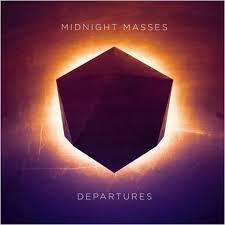The neon city and the sprawling desert might seem like the most diametrically opposed of things, but instead of being poles apart, the two can come to represent the long line that stretches from near nothingness to the exhaustive, surreal cityscape, where loss can transform into life. While five years may have passed since the release of Midnight Masses acclaimed Rapture, Ready, I Gazed At The Body EP, Departures takes off from the same point, attempting to capture what lead singer Autry Fulbright describes as "the sound of a city […] in the middle of the desert" as a method for memorial.
In 2008, Midnight Masses emerged as a means through which Fulbright could process the death of his father. As a band that has, in moments, swelled to more than 14 members and counted the late Gerard Smith of TV On The Radio among them, Midnight Masses, all together, have witnessed a considerable amount of loss; losses, in fact, that led to a hiatus and near disbandment. For the band, it’s perhaps taken as long to process what’s been incurred, find a middle ground where reaction can become reality and chisel the black stone of grief into a more formalised art.
For this reason, a multitude of interpretations and styles grapple for a dominant foothold on Departures. Juxtaposed against the more immediate confusion and concreteness of Rapture and recorded at the sprawling Sonic Ranch in Tornillo, Texas, the album seems to stretch out into a fragmentary sparseness, making a playground of the minutiae of daily losses that must be eulogised and lived through once more. Much like its predecessor, song titles like ‘All Goes Black’, ‘Hollywood Death Forever’ and ‘Be Still’ allude to the purposeful cataloguing of grief without the more apparent poignancy of the band’s first effort.
Within the spare, fuzzy sound of the songs that splinter like tree branches, a broad range of influences are evident. ‘Am I A Nomad?’ is an ambivalent tribute to the travelling life, its drumbeat akin to the movement of a bird’s wings or the forward propulsion of a jet plane. The eponymously named ‘Departures’ recalls the vocals of Josh Homme, before the song barrels into a cathartic, psychedelic Queens Of The Stone Age-like riff that ends with the revelatory line "all the lights will blind you as life flashes behind you". The two-minute ditty ‘Clap Your Hands’ harkens back to the classic rock tunes of the late 60s and their simple, straightforward sound, while the quick spell of ‘Everywhere Is Nowhere’ is like a Sonic Youth jam that’s broken free from the early 2000s. Ironically, Departures wraps up with its most decisive song, ‘There Goes Our Man’, a track that might have influenced the style of the entire album if it had come three years sooner. As a tender, lilting entreaty to death and a counterbalance to its finiteness, it’s a good place for the album to end, with a question left dangling in the air.
Death and loss may seem like absolutes, but Departures is an album of in-betweens, before the anxieties associated with grief have had a chance to crystallise into something more pointed. With old losses that remain familiar and their trajectory as a band still somewhat undefined, Midnight Masses are still traversing that space that comes between darkness and light, where hope is grasped at before it’s certain that it will come to pass. Whether the band will find more comfort in the dark, or move closer to the magnetising gleam of the city remain to be seen, but whatever comes to be Departures sees the band moving into what might be a more cohesive vision, and closer to the ever-blurry and vexing line of life.
<div class="fb-comments" data-href="http://thequietus.com/articles/15834-midnight-masses-departures-review” data-width="550">


